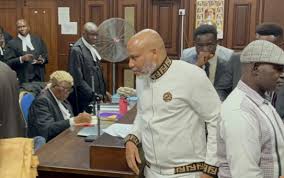
Daniel Otera
The protracted terrorism trial of Nnamdi Kanu, the embattled leader of the Indigenous People of Biafra (IPOB), took another unexpected twist on Wednesday as the Federal High Court in Abuja extended yet another olive branch to the defendant, allowing him more time to prepare his defence or risk waiving it entirely.
This latest adjournment, the fourth of its kind underscores the delicate balance between ensuring a fair trial and expediting justice in a case that has gripped the nation since Kanu’s dramatic rendition from Kenya in 2021.
Kanu, facing a seven-count charge related to terrorism, has consistently challenged the validity of the accusations against him. The Federal Government alleges that his broadcasts and activities incited violence and promoted secessionist ideals, charges that stem from his role in IPOB, a group proscribed as a terrorist organisation in Nigeria.
The prosecution wrapped up its case back in June 2025, presenting evidence from five witnesses. Kanu was then ordered to open his defence, but he has repeatedly demurred, insisting the charges are flawed and based on outdated legislation.
During the heated session on Wednesday, Kanu addressed the court at length, bypassing the immediate task of mounting his defence. He argued passionately that the Terrorism Prevention and Prohibition Act under which he is charged has been repealed, rendering the entire process invalid.
“The Terrorism Prevention and Prohibition Act has been repealed. I cannot put up a defence under a repealed law. I won’t do that,” Kanu declared firmly from the dock.
He further invoked a Supreme Court ruling from earlier in the saga, claiming it mandated the government to amend the charges, a step he says has not been taken.
Read Also: Kanu Risks Losing Right To Defence As Court Issues Final Warning
“The Supreme Court, in its judgment ordering his trial, had directed the Federal Government to amend the charge since the one currently against him had been repealed,” Kanu emphasised, referring to himself in the third person as he built his case.
Justice James Omotosho, presiding over the matter, listened patiently but reminded Kanu to “keep his gunpowder dry” a subtle nudge to reserve his arguments for the actual defence phase. Undeterred, Kanu pressed on, stating he required consultations with his team of legal advisers: Nnaemeka Ejiofor, Aloy Ejimakor, Maxwell Okpara, and Mandela Umegborogu.
The judge, showing a measure of leniency, advised Kanu to seek input from experts in criminal law. “I am inclined to bend backwards once more to give Kanu another opportunity to reconsider his stance,” Justice Omotosho explained, adjourning the case to November 7. He stressed that this decision was made “in the interest of justice, both to the defendant and to the nation.”
On the prosecution side, Adegboyega Awomolo, representing the Federal Government, pushed for stricter enforcement of prior court orders.
“We urge the court to enforce its previous order requiring Kanu to open his defence or waive his right to do so,” Awomolo argued, reflecting the government’s frustration with the ongoing stalls.
This is not the first time Kanu has cited logistical hurdles. In late October, he blamed his former lawyers for failing to hand over crucial documents. Back in September, the court dismissed his no-case submission, ruling that the prosecution had established a prima facie case warranting a defence.
Legal analysts point out that such adjournments, while aimed at upholding due process, risk eroding public confidence in the judiciary. “Cases like this test the limits of patience in our legal system,” noted a senior barrister in Abuja, speaking on condition of anonymity. “It’s a reminder that justice delayed can sometimes feel like justice denied, especially in matters touching on national security and unity.”
Kanu’s trial has broader implications beyond the courtroom. IPOB’s agitation for Biafran independence has fuelled tensions in Nigeria’s southeast, leading to sporadic violence and economic disruptions. Supporters view Kanu as a freedom fighter, while critics label him a threat to national cohesion.
As the November 7 date approaches, all eyes remain on whether Kanu will finally enter his defence or continue contesting the charges’ foundation.
